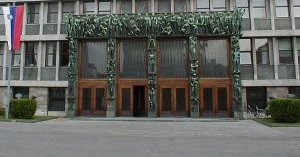There was never a doubt about what Slovenia would do. Firstly, our own Constitution does not allow referenda on international treaties. The international treaties (which the Constitution de jure is) must always be ratified by the Parliament. Yet you can question it, as we are used to having referenda for all kind of obscurities. Furthermore, the option of a consultative referendum could have easily been applied if the will had have existed. Is a Constitution not politically important enough to hold a referendum on it? We have had referenda on artificial insemination of single women. The argument of historical importance can not be applied to Slovenia, where referenda take place only on issues where the public opinion is highly split or where the elected representatives cannot reach any decisions. Secondly, the support among the main political actors on the Constitution is strong. In fact, we barely have any Euroscepticism in Slovenia as well as (unfortunately) we depend very little on public opinion when it comes to issues of “international” nature. The justification that the political elite offered for such a quick ratification was to set a good and positive example for other countries to follow, nevermind the knowledge that an average Slovene citizen has or has not on the whole process.
There was a bizarre twist in the whole ratification process. The leading political forces in the country somehow decided that the ratification did not require prior information campaign, therefore it was decided to offer it after the Constitution has been ratified. The government promised to provide enough information on the Constitution to silence those few journalists who were pressing for it before the ratification, yet it has been two months now and so far nothing has happened. No booklets, no public debates, no information available except in the Commission Representation Office, nothing... Both governments, the previous and the current one, could have easily provided a fair amount of information for the citizens on the process of constructing, signing and ratifying the Constitution, however it still seems a task nobody wants to push forward. Or maybe there is a misguided feeling that the Commission should be responsible for that. So far, only a few NGO’s have been interested in raising the awareness of the Constitution, and they have been hardly supported by the co-state’s funding.
Referendum or not, the Constitution is one of the most significant treaties in the European history and therefore needs to be introduced to the citizens. It is of vital importance to sum up the main ideas and present them to the citizens, and to show the clear need and desire for further political integration. And why it is so important to do it in countries that are not holding referenda? While we all tremble under the importance of YES campaign, and put our focus on those big, “important” countries like France, the UK and Poland etc., we tend to forget that the long-term results can be far worse in those “unimportant” countries that are not having a vote and form the majority of EU Member States. In terms of awareness and of a pro-European identity, lack of proper information will mean that the European Project, and in particular the democratic deficit, will be far worse off in the long term. Ignorance can be as bad as political manipulation, but in my opinion far worse than the willful decision made upon weighted facts. Our organizations should therefore do their best not just in terms of YES campaigning, but also increasing awareness and distributing information to as wide circle of recipients as we can, yet still raising certain issues and debates on how things could be improved in the long-term. It is an ongoing fight that we must win.


Follow the comments: |
|
